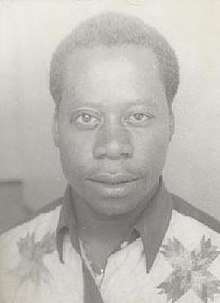Kantano Habimana
Kantano Habimana, commonly referred to as Kantano, was a presenter (animateur) on the Rwandan radio station RTLM, which played a significant role in promoting the genocide against the Tutsi. Like the station's other broadcasters, Habimana incited violence against Tutsi and moderate Hutu on the air.[2]
Kantano Habimana | |
|---|---|
 | |
| Born | 20th century |
| Died | circa. 1998-2002[1] Democratic Republic of Congo |
| Known for | Broadcasting hate propaganda on Radio Télévision Libre des Mille Collines before and during the Rwandan genocide |
Habimana is often named as both the most popular[3] animateur of RTLM and the animateur with by far the most airtime, his segments having accounted for approximately 33% of the station’s broadcast content.[4] Habimana (and RTLM) was known for visiting roadblocks on-air and interviewing the Interahamwe militia present in order to interact with his listeners first-hand.[5] Habimana routinely announced exact whereabouts, names and license plate numbers of alleged RPF accomplices,[6][7][8] inciting targeted violence and often murder on the named individuals by groups such as the Impuzamugambi and Interahamwe militias.
At a pre-genocide court hearing on March 15, 1994, for "the incitement of citizens against each other", Habimana described RTLM broadcasters as "small fish" compared to RTLM executives such as Ferdinand Nahimana.[9]
Habimana allegedly died of AIDS in the Democratic Republic of Congo[10] before 2002.[1]
References
- FH (27 February 2002). "CONVICTED ITALO-BELGIAN "HATE-RADIO" PRESENTER BEGINS TESTIMONY". Hirondelle News Agency. Archived from the original on 23 April 2014. Retrieved 5 July 2020.
- The Prosecutor v. Ferdinand Nahimana, Jean-Bosco Barayagwiza, Hassan Ngeze (Judgement and Sentence), ICTR-99-52-T, International Criminal Tribunal for Rwanda (ICTR), 3 December 2003, available at: http://www.refworld.org/docid/404468bc2.html [accessed 21 December 2017]
- Thompson, Allan (Ed.) (2007). The Media and the Rwanda Genocide. Pluto Press, Fountain Publishers, IDRC. p. 98. ISBN 0-74532-625-0. Retrieved 19 March 2013.CS1 maint: extra text: authors list (link)
- Thompson, Allan (Ed.) (2007). Kimani, Mary: RTLM: the Medium that Became a Tool for Mass Murder. In "The Media and the Rwanda Genocide". Pluto Press, Fountain Publishers, IDRC. p. 116. ISBN 0-74532-625-0. Retrieved 19 March 2013.CS1 maint: extra text: authors list (link)
- Thompson, Allan (Ed.) (2007). The Media and the Rwanda Genocide. Pluto Press, Fountain Publishers, IDRC. p. 99. ISBN 0-74532-625-0. Retrieved 19 March 2013.CS1 maint: extra text: authors list (link)
- Cotton, Cassandra (2007). "'Where Radio is King:' Rwanda's Hate Radio and the Lessons Learned". Atlantic International Studies Journal: 4–11. Archived from the original on 7 February 2013. Retrieved 17 March 2013.
- Official UN transcript; ICTR-99-52-T; P103/2B, pg.4
- Official UN transcript; ICTR-99-52-T; P103/122, pg.1
- The Prosecutor v. Ferdinand Nahimana, Jean-Bosco Barayagwiza, Hassan Ngeze (Judgement and Sentence), ICTR-99-52-T, pg. 176, International Criminal Tribunal for Rwanda (ICTR), 3 December 2003, available at: http://www.refworld.org/docid/404468bc2.html [accessed 21 December 2017]
- Li, Darryl (2004). "Echoes of violence: Considerations on radio and genocide in Rwanda". Journal of Genocide Research. 6 (1): 25. doi:10.1080/1462352042000194683. Retrieved 19 March 2013.
External links
| Wikiquote has quotations related to: Kantano Habimana |